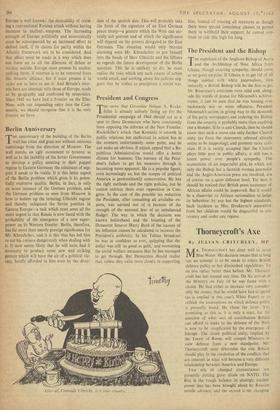Berlin Anniversary
THE anniversary of the building of the Berlin wall has come and gone not without ominous mutterings from the direction of Moscow. The wall stands, an ugly monument to tyranny as well as to the inability of the Soviet Government to develop a policy assuring to their puppet regime in Eastern Germany the minimum of sup- port it needs to be viable. It is this latter aspect of the Berlin problem which gives it its poten- tially explosive quality. Berlin, in fact, is only an acute instance of the German problem, and the German problem as seen from Moscow is how to bolster up the tottering Ulbricht regime and thereby safeguard the Soviet position in Eastern Europe—a task which must seem all the more urgent in that Russia is now faced with the probability of the emergence of a new super- power on its Western frontier. Berlin, therefore, has far more than merely prestige significance for Mr. Khrushchev, and it is this that has led him to cut his corners dangerously when dealing with it. It now seems likely that he will soon find it necessary to produce some new and striking gesture which will have the air of a political vic- tory, hardly afforded to him even by the diver- iver-
sion of the sputnik duo. This will probably take the form of the signature of an East German peace treaty—a gesture which the West can cer- tainly not prevent and of which the significance will depend on the powers delegated to the East Germans. The situation would only become alarming were Mr. Khrushchev to put himself into the hands of Herr Ulbricht and his fellows as regards the future development of the Berlin question. This he is unlikely to do; he must realise the risks which any such course of action would entail, and nothing about his policies sug- gests that he wishes to precipitate a world war.






























 Previous page
Previous page